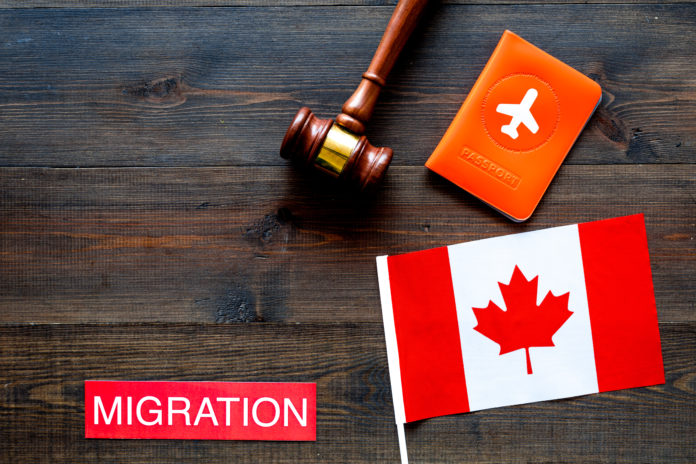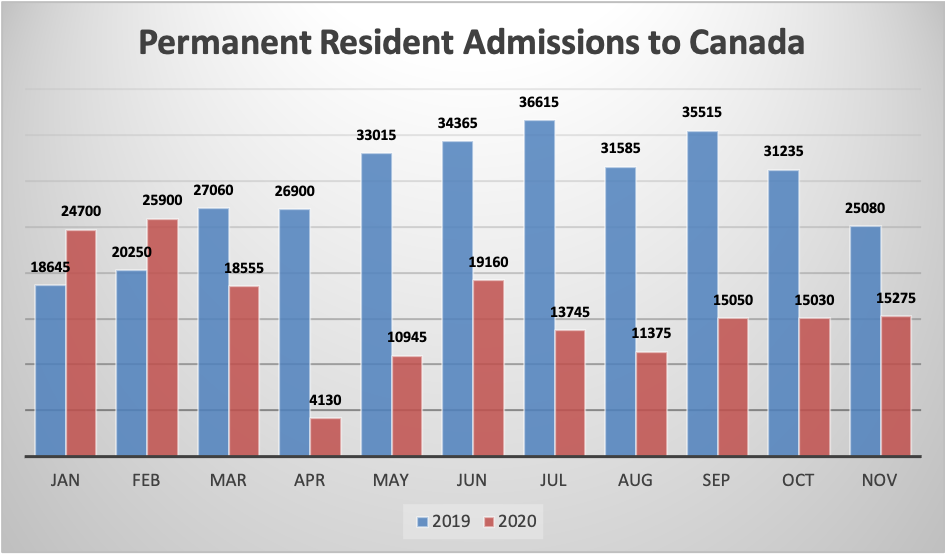
Immigration to Canada is still woefully below the healthy flow of immigrants seen before the COVID-19 global pandemic, but did rise to its highest level since June last year in November.
In November, 15,275 new permanent residents came to Canada, up 1.6 per cent from the 15,030 in October.
The most recent immigration figures also show November was a stronger month for Canadian immigration than any other since June when 19,160 immigrants came to Canada.
That bump up in immigration during the summer was partly a correction for the trickle in new arrivals in April when only 4,130 people immigrated here.
Despite the latest upwards nudge in the flow of immigration, the number of newcomers to Canada remains very low compared to pre-pandemic levels.
During the previous year, 25,080 immigrated to Canada in November, which means immigration levels were still off by slightly more than 39 per cent in November 2020.
Read More
COVID-19: These Are Canada’s Most In-Demand Jobs for 2021
How Businesses Can Help New Immigrants Boost Canada’s Economy After COVID-19
Labour Mobility Think-Tank Urges Canada To Cut Immigration Application Processing Times
It’s not that Canada is shying away from welcoming newcomers. Ottawa is bullish on immigration and has raised immigration targets to bring in more than ever.
The federal government wants to welcome more than 1.2 million newcomers between 2021 and 2023. There are to be 401,000 new permanent residents to Canada this year, 411,000 next year, and 421,000 in 2023.
“Immigration is essential to getting us through the pandemic, but also to our short-term economic recovery and our long-term economic growth,” Immigration Minister Marco Mendicino has said. “Canadians have seen how newcomers are playing an outsized role in our hospitals and care homes and helping us to keep food on the table.
“As we look to recovery, newcomers create jobs not just by giving our businesses the skills they need to thrive, but also by starting businesses themselves,” he said. “Our plan will help to address some of our most acute labour shortages and to grow our population to keep Canada competitive on the world stage.”
New permanent resident “arrivals” can either be candidates already in Canada transitioning from a temporary status or those from overseas covered by an exemption to travel restrictions.
Current restrictions on international travel and the closure of the Canada-U.S. border are in place until at least January 21, 2021, as the federal government looks to quell the second wave of COVID-19 infections.
The restrictions bar entry to all except citizens and permanent residents, with some exemptions.
Canada currently has exemptions in place for the following people, provided they are travelling for a non-discretionary reason.
- Seasonal agricultural workers, fish/seafood workers, caregivers and all other temporary foreign workers.
- International students who held a valid study permit, or had been approved for a study permit, when the travel restrictions took effect on March 18, 2020. More international students will be allowed to travel from October 20 under a new exemption.
- Permanent resident applicants who had been approved for permanent residence before the travel restrictions were announced on March 18, 2020, but who had not yet travelled to Canada.
- Immediate family members of Canadian citizens and permanent residents are also exempt if entering to be with an immediate family member for at least 15 days.
- Extended family members of citizens and permanent residents, plus foreign nationals travelling on compassionate grounds.
Recent news on the delivery of the first COVID-19 vaccines to Canada means a clearer picture is developing of when travel and border restrictions could be loosened.
Given the predictions being made by vaccine experts, it seems likely to be the second half of 2021 before travel normality can start to resume.


